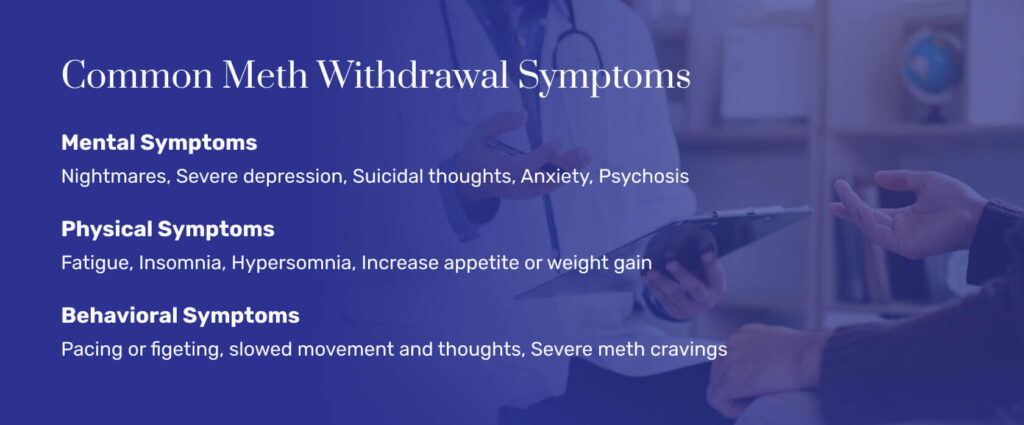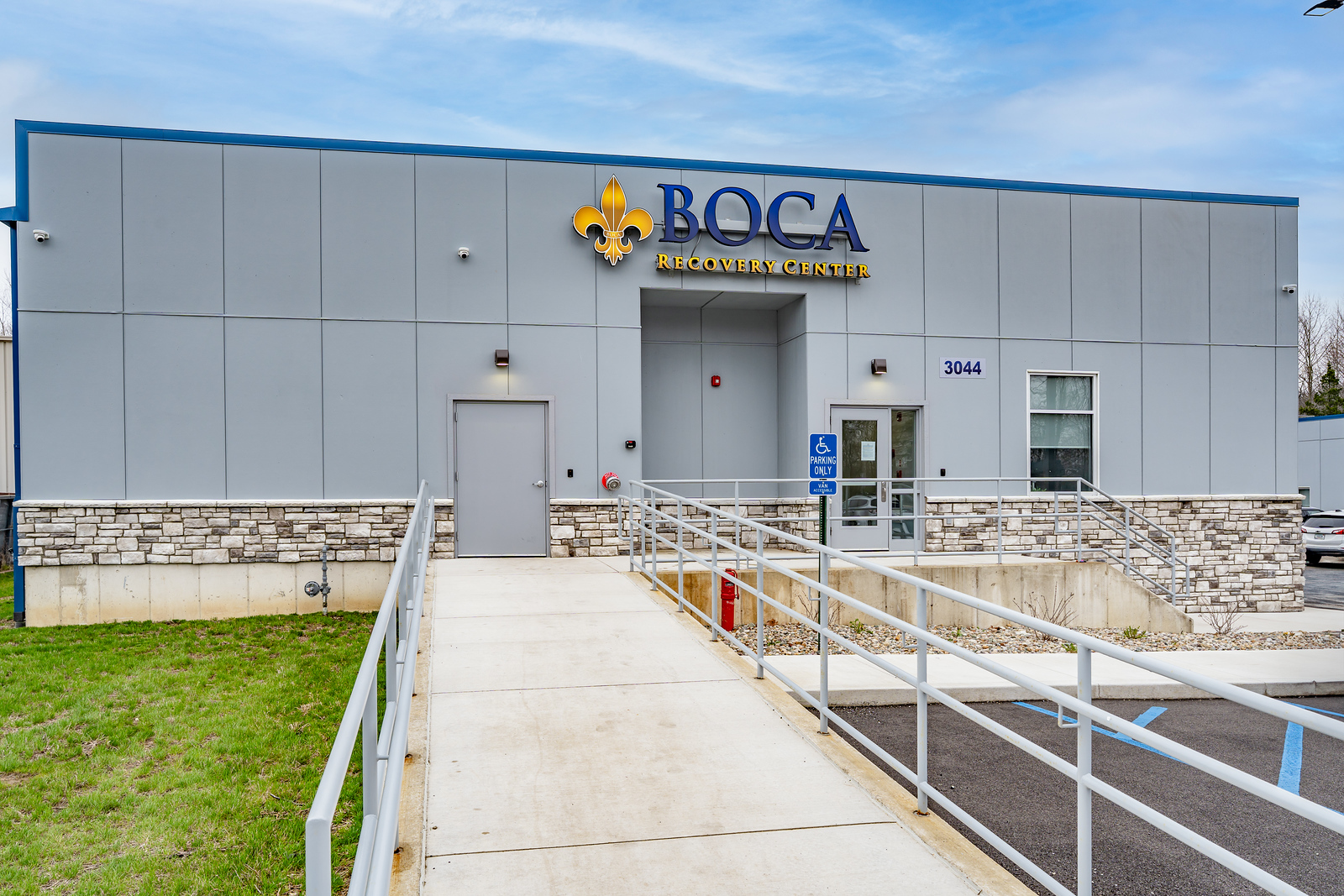Meth is a powerful and highly addictive stimulant drug that produces an intense high, followed by an intense comedown. If someone is addicted to this stimulant and abruptly quits, they’ll experience unpleasant meth withdrawal symptoms. But don’t let that intimidate you – withdrawal is manageable and a life after addiction is worth it. If you’re ready to break free from your meth addiction, let’s explore the withdrawal process, what you can expect, and how to get sober.
Meth Withdrawal Symptoms
Suddenly quitting meth once you’ve developed a dependence or addiction can result in a myriad of withdrawal symptoms, including:
Fatigue
Nightmares
Insomnia
Hypersomnia
Pacing or fidgeting
Slowed movements and thoughts
Increased appetite and weight gain
Severe meth cravings
Severe depression
Suicidal thoughts or behaviors
Inability to feel pleasure (anhedonia)
Anxiety
Psychosis
Crystal meth and methamphetamine are typically used in a “binge and crash” pattern, which means taking frequent high doses of meth over a short time to maintain an intense high. This is then followed by a come-down or “crash,” which involves severe fatigue and depression that can last for a few days.
As such, meth withdrawal differs from the withdrawal syndrome associated with other substances like opioids or benzodiazepines which people tend to use compulsively and regularly to stave off withdrawal symptoms as opposed to binges.

Lingering or Protracted Withdrawal Symptoms
The above symptoms are associated with acute meth withdrawal, but once those symptoms resolve, some protracted withdrawal symptoms may linger for weeks or months. These may include impaired executive control functions, such as:
Memory
Problem-solving
Organization and planning
Self-control
Impulse-control
Attention
Emotional regulation
Additionally, symptoms of psychosis like hallucinations may last for months or years after someone quits methamphetamine, which highlights the need for ongoing treatment and support.
Moreover, chronic meth abuse can cause effects similar to Parkinson’s disease, which can last long after the person has gone through acute withdrawal and detox.


Signs of Meth Abuse
How Long Does Meth Withdrawal Last
Typically, you can expect acute meth withdrawal to last between 7 and 10 days, depending on many factors. Because of its long-lasting effects, meth withdrawal tends to last longer and be more intense than other stimulants like cocaine.
Withdrawal Timeline
The crystal meth withdrawal timeline can vary depending on a person’s individual physiology, how they administered meth, and more. However, you can expect the withdrawal timeline to look something like this:
| Time Since Last Use | Symptom Manifestation |
|---|---|
| A few hours | You begin to “crash” |
| 24 hours | Acute withdrawal peaks and your symptoms are at their highest intensity |
| Day 2 | Symptoms start to slightly improve from the previous day, but you’re still in the acute withdrawal phase with symptoms like sleeping excessively, eating more, and depression |
| Days 3 – 6 | Through the acute withdrawal phase, your symptoms gradually improve from their initial peak |
| Days 7 – 10 | Your acute withdrawal phase ends and your symptoms have mostly resolved |
| Days 11 to 21+ | During this subacute phase, you have a mild level of the withdrawal symptoms you had during your acute withdrawal |
You might have mild but longer lasting symptoms that are referred to as post acute withdrawal syndrome or PAWS, with symptoms like irritability, cravings, anxiety, low energy, and poor sleep. As explained by Alison Tarlow, PsyD, “It’s really important to know that post acute withdrawal syndrome may not be avoidable, however with the right medical treatment, we can certainly reduce the symptoms that can be very uncomfortable.” It can last anywhere from a few weeks up to a year after detox.
Can You Die from Meth Withdrawal?
No, the symptoms of meth withdrawal don’t tend to be life-threatening on their own. However, mental health symptoms like depression and suicidal ideation may be so severe that a person may be at risk of self-harm and require intensive treatment or hospitalization.
Sometimes meth withdrawal may include psychosis, paranoia, and hallucinations. And while these symptoms aren’t fatal, they can be dangerous due to detachment from reality and the increased risk of accidents and injuries.
It is always safer to undergo meth withdrawal in a professional detox facility or hospital where you can receive appropriate medical and psychiatric care. In this type of facility, medical professionals can also help to manage your withdrawal symptoms so you’re less likely to relapse.
Factors that Affect Meth Withdrawal
The severity and duration of withdrawal symptoms can vary, depending on factors, such as:
Withdrawal history
Dose and frequency of meth use
Polysubstance use
Co-occurring mental health disorders
Comorbid medical conditions
Drug purity
Method of administration (e.g. injecting, smoking, or snorting)
Should I Go Through Withdrawal on My Own?
Although it is possible to go through methamphetamine withdrawal cold turkey at home, you may feel more comfortable and supported in an intensive detox setting, where you can receive 24/7 care, supervision, and monitoring while you detox.
Plus, if you attend a professional detox program, you’ll greatly increase the chance that you’ll not only complete meth withdrawal without relapsing but also will transition to a comprehensive addiction treatment program.
The Best Way to Manage Meth Withdrawal: Detox Options
The primary goal of treating meth withdrawal is to alleviate symptoms, reduce cravings, and become medically stabilized to support a full recovery.
The best way to safely withdraw from meth is under the supervision of a medical professional in a formal detox setting. There are many levels of care for meth detox, including:
You receive 24/7 care, supervision, and monitoring in a hospital or free-standing detox center. This option is the most intensive and can help prevent or address any medical complications or emergencies that arise during withdrawal.
Residential detox
You receive around-the-clock care with some medical care but not as intensive as in a hospital. This setting resembles a home environment.
Partial hospitalization/intensive outpatient
These detox options allow you to live at home while withdrawing from meth while attending up to 30 hours of care per week at a hospital. This option is a nice balance of flexibility and intensiveness for people who have a strong support system and are confident they can complete withdrawal without relapsing.
Outpatient detox
The least intensive and structured option, you live at home and attend detox sessions for a few hours per week.
If you are ready to quit meth and want to receive professional detox, contact us at Boca Recovery Center. We offer medical detox services that can keep you safe and comfortable during withdrawal, in addition to a full continuum of residential and outpatient treatment programs to help you recover from your addiction and build a healthy new life in sobriety.
While each person’s experience with meth withdrawal is different, the bulk of your symptoms will be in your first 7 to 10 days after you stop using meth. This is called the acute withdrawal phase. You may have different or mild symptoms after this for a few weeks.
Meth withdrawal has a low risk for medical complications, so typically it’s not dangerous to detox at home on your own. Self-detox does have a high risk of relapse, though. If you want to begin your recovery, your best bet is to work with an addiction professional for detox, and it may be an option to do outpatient detox so you can stay at home but have monitoring daily.
During your meth withdrawal, you may receive medical care to reduce your symptoms. This can include medications that target specific symptoms, for example, like pain relievers or anxiety medications.
- Methamphetamine DrugFacts. (May 2019). National Institute on Drug Abuse.
- Withdrawal Symptoms in Abstinent Methamphetamine-Dependent Subjects. (2010). Addiction (Abingdon, England), 105(10), 1809–1818.
- Treatment for stimulant use disorders. Treatment Improvement Protocol (TIP) Series 33. SAMHSA Publication No. PEP21-02-01- 004. (2021). Rockville, MD: Substance Abuse and Mental Health Services Administration.
- Diagnostic and statistical manual of mental disorders (5th ed.). American Psychiatric Association. (2013).
- Protracted Withdrawal. Substance Abuse and Mental Health Services Administration.
- The Nature, Time Course and Severity of Methamphetamine Withdrawal. (2005). Addiction (Abingdon, England), 100(9), 1320–1329.











